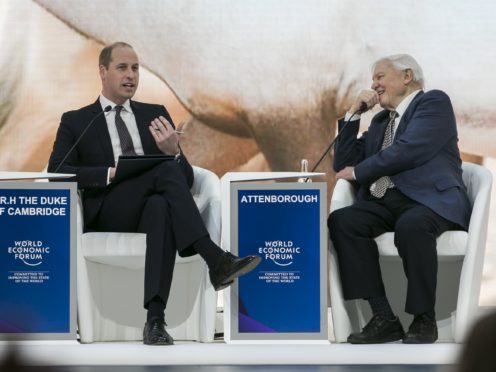Sir David Attenborough has warned it is difficult to overstate the environmental crisis facing the planet, as he was interviewed live on stage by the Duke of Cambridge.
The veteran broadcaster urged leaders to care for the natural world as he spoke with William at the World Economic Forum in Davos, Switzerland.
The Blue Planet and Dynasties narrator stressed the “frightening” mechanisms humans have for destruction, and warned how a healthy natural world was “absolutely essential” to human life.
Sir David told the duke: “The future of the natural world is in our hands. We have never been more powerful.
“We can wreck it with ease. We can wreck it without even knowing we are doing it.
“And if we wreck the natural world, in the end, we wreck ourselves.”

The broadcaster added: “It is difficult to overstate it. We are now so numerous, so powerful, so all-pervasive, the mechanisms that we have for destruction are so wholesale and so frightening, that we can actually exterminate whole ecosystems without even noticing it.”
Sir David also discussed his new nature documentary Our Planet, saying streaming it on Netflix would allow it to be seen by millions of people around the world.
The incredible story of the one place we all call home. It's #OurPlanet. 🌎 pic.twitter.com/x1Ga4Kt3wD
— Our Planet (@ourplanet) November 8, 2018
Describing the modern technology used in his documentary making, he said: “The facilities we now have are unbelievable. We can go everywhere. We can go to the bottom of the sea, we can go into space, we can use drones, we can use helicopters, we can speed things up and we can slow them down.
“So the natural world has never been exposed to this degree before.”
He urged people “not to waste the riches of the natural world on which we depend” and to respect the planet by not throwing away food or power.
Sir David added: “Just care for the natural world, of which we are an essential part.”
📺 LIVE: The Duke of Cambridge in conversation with Sir David Attenborough at #WEF19 on the urgent challenges facing the next generation of environmental leaders: https://t.co/CcYMfonaDL
— Kensington Palace (@KensingtonRoyal) January 22, 2019
Second in line to the throne William described it as a “personal treat” to be interviewing Sir David.
The duke has spoken of his fondness for watching Sir David’s programmes as a child and previously described him as having “the single most important impact in my conservation thinking”.
He revealed in Davos: “It’s a personal treat for me to be sitting here asking you questions.
“Normally I have to endure people asking me questions so it’s quite nice to be turning the tables for once.”
One of Sir David’s favourite clips from Our Planet – dramatic footage of an Arctic glacier carving up and falling into the sea – was played during the Forum.
The naturalist said: “One of the most immediate dangers facing the planet today is rising temperatures… In the Arctic temperatures are rising very fast.”
As Sir David discussed the difficulty in capturing the fast-moving glaciers on film, William joked that they were “a bit like children – unpredictable”.
On Monday, Sir David was given a Crystal Award for his leadership in environmental stewardship at the WEF, and used his acceptance speech to call for a plan to tackle environmental problems.

William asked Sir David: “People of my generation now are beginning to step into positions of leadership around the world.
“The work to save the planet is probably, largely going to happen on our watch.
“What advice do you have for my generation?”
Sir David, who was given a standing ovation by delegates at the end of the interview, responded: “There has never been a time when more people have been out of touch with the natural world, than there is now.
“We have to recognise that every breath of air we take, every mouthful of food we take, comes from the natural world.
“And if we damage the natural world, we damage ourselves. We are one coherent ecosystem.
“It’s not just a question of beauty, or interest, or wonder – it’s the essential part of human life is a healthy planet.”
The pair also discussed how Sir David will be seeking a global deal for nature in Beijing in 2020.
Tanya Steele, chief executive of WWF-UK (World Wildlife Fund) of which the naturalist is an ambassador, welcomed his call for action.
“We urgently need a new global deal for nature and people to kick-start a worldwide programme of recovery and, at the same time, bold action to restore nature at home in the UK,” she said.
“We are the first generation to know that we are destroying the world and almost certainly the last that can do anything about it.”
